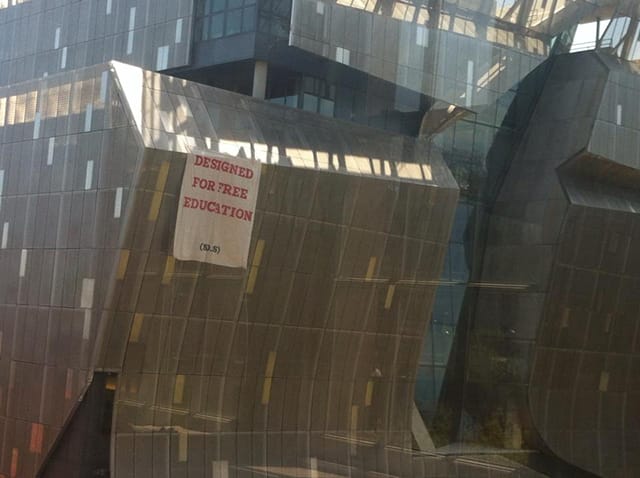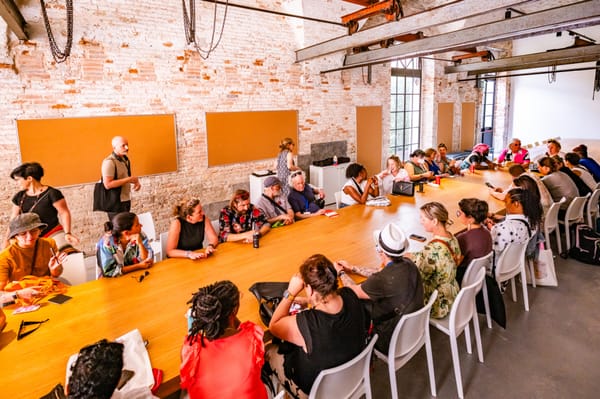In Historic Vote, Cooper Union Board Ratifies Tuition for 2014
In an email to the Cooper Union community sent a little after 8pm EST, board of trustees chairman Richard S. Lincer conceded that "tuition remains the only realistic source of new revenue in the near future."

In an email to the Cooper Union community sent a little after 8pm EST, board of trustees chairman Richard S. Lincer conceded that “tuition remains the only realistic source of new revenue in the near future.” Lincer’s preliminary report on the results of today’s board meeting struck a conciliatory tone and acknowledged an “enormous debt of gratitude” to the Cooper Union Working Group, which had in June submitted to the board of trustees a comprehensive report offering non-tuition financial alternatives.
Lincer writes that in December the board reviewed this proposal with the assistance of the Huron Consulting Group, an international management consulting company. Their conclusion was that proceeding without instituting tuition was fiscally untenable, though Lincer allowed that “we will set out to develop the resources that can allow us to increase student aid over time, augmenting need-based financial aid and ultimately perhaps even restoring the full tuition scholarship.”
The full message is copied below (note that the bold emphasis is in the original):
While we cannot now restore the full tuition scholarship, the board will commit itself to exploring Working Group recommendations, which — coupled with investments in our academic program — can continue to position The Cooper Union as the one of the most unique and exceptional educational institutions in the United States. As part of that long-term commitment, we will set out to develop the resources that can allow us to increase student aid over time, augmenting need-based financial aid and ultimately perhaps even restoring the full tuition scholarship.
We cannot reasonably project how or when we can restore this aspect of The Cooper Union’s legacy. But as we work together to find new ways to get The Cooper Union onto stable financial ground, we will also work together to develop a contemporary mission for the institution.
We must, and will, find a way to move The Cooper Union ideal forward despite the changed economic circumstances in which we find ourselves. Despite the changes, our admissions will continue to be based strictly on merit. The spirit that animates learning in the classroom, the studio and the lab must remain fundamentally egalitarian. We must reaffirm our commitment to educating the working-class students for whom Peter Cooper founded the school in 1859.
The economics alone are bigger than tuition. The overall landscape of higher education and the economic realities of New York City are different. The Cooper Union’s traditional tuition scholarship has benefited all students who can attend, but has never sufficiently addressed students’ increasing living expenses. Historically, these costs may have been negligible, but they now constitute a barrier to participation for many prospective students.
For some students, a full tuition scholarship is not enough. The Cooper Union still attracts a sizeable proportion of students whose financial circumstances make them eligible for Pell grants (approximately 20 percent). Many of these students are able to commute to campus, but many others must find housing in order to attend. It seems imperative that we do better by these students than we do right now. In order to ensure the access that motivated Peter Cooper to found the school, we need to provide additional aid to ensure that any deserving student can attend.
To these ends, the board will constitute a group of trustees to work with faculty, students, administration, staff, alumni and friends to clarify the mission for the 21st century and to develop a strategic plan for implementing the mission. Foremost among their concerns will be sustaining merit-based admissions, increasing accessibility for students from all backgrounds and, to the extent our resources allow, adding resources to the overall tuition scholarship.
The committee will be reaching out to the community in the coming months and will ensure that this process is inclusive and transparent. We recognize there have been strongly felt feelings on both sides of the tuition issue. We also recognize that now is the time for The Cooper Union community to come together to build on all the strengths we can offer. The Working Group report can best be understood, we think, as a step in this process of looking carefully at our current realities and developing creative alternatives that can carry the institution forward. We look forward to continuing this process with the community.
We commit, as we have always committed, to access for everyone who deserves to get in, and to programs that deserve to be called the best.
Richard S. Lincer, chair
The Cooper Union Board of Trustees




